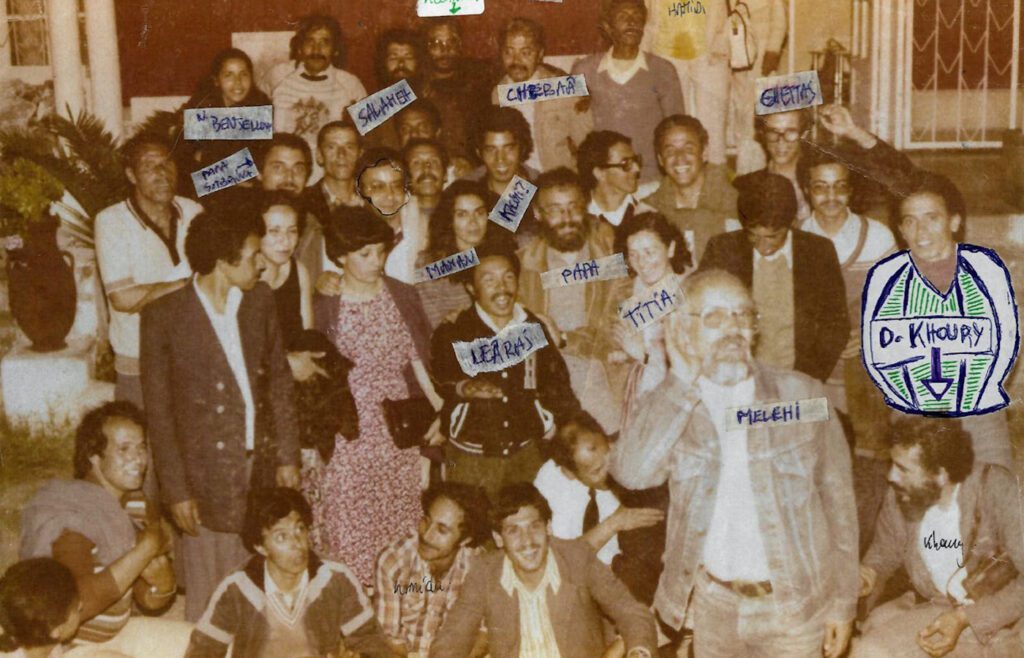ifa-Galerie, Berlin, Germany
16 Feb 2024 - 12 May 2024

Group photography in front of Dr Abdellah Ziou Ziou’s service accommodation in Berrechid. June 1981. Archives Dr Ziou Ziou
School of Casablanca highlights a pivotal moment in Moroccan art history that had wide-ranging implications for the entire region: the beginning of modern art in the now independent country (1956). With contributions by: Bik Van der Pol, Céline Condorelli, Fatima-Zahra Lakrissa and Gilles Aubry, Manuel Raeder, Marion von Osten, Peter Spillmann, Abdeslam Ziou Ziou with Grocco-Trick 54, Sophia Attigui, Fatine Arafati, and Nassim Azarzar
A new civic awareness emerged which impacted both artists and intellectuals seeking to reconsider their social function and visibility in the public sphere. Through this process, the artist became the producer of a social and cultural project in which art was seen as a space of shared knowledge and experience. The Casablanca Art School was a seminal forum for the development of these ideas and related practices. Its members were united by a keen awareness that a new national culture could only emerge in the postcolonial period if modernity’s demands were rooted in Indigenous cultural practices. Drawing on the Bauhaus Manifesto, among others, the school engaged in creating models for rethinking the relationship between art, craft, design, and architecture within a local context.
School of Casablanca is a collaboration between ifa-Galerie Berlin, KW Institute for Contemporary Art (Berlin) and ThinkArt (Casablanca). It started in 2020 and was realized with the support of the Sharjah Art Foundation, the Goethe-Institute Morocco and Zamân Books & Curating. The project draws from the legacy of the Casablanca Art School and its innovative pedagogical methods, modernist aesthetics, and exhibition strategies in 1960s Morocco. Launched in 2020 with a residency program, it continues with an exhibition, which takes place at various locations in Casablanca between 11 November 2023 – 14 January 2024.
This collaborative initiative seeks to further the legacy of the Casablanca Art School in contemporary thought, which is relevant not only within a Moroccan context but also in relation to critical reflection on the traditions of Western methodology and self-perception.
School of Casablanca revisits and reinterprets the radical ideas and actions of the group of individuals (Farid Belkahia, Mohammed Chabâa, Bert Flint, Toni Maraini, and Mohamed Melehi) who shaped the original school at its peak (1964–69). In doing so, it draws from the spirit of experimentation, discourse, self-organization, and community building embodied by Souffles, a now-iconic Moroccan cultural magazine of the time. Founded as an avant-garde cultural review in 1966, its creators (Abdellatif Lâabi, Mostafa Nissaboury and Mohammed Khaïr-Eddine) collaborated extensively with the Casablanca Art School. Banned by the authorities in 1972, the magazine was an important focal point for Moroccan and international artists, poets, painters, filmmakers, playwrights, intellectuals, and other cultural figures.
Over the past years, the invited participants to School of Casablanca, ranging from artists, designers, and curators to independent researchers, conducted research and fieldwork within the city of Casablanca. They shared their process in a public program, which was hosted as part of the residency program. This exhibition brings the newly commissioned work into a dialogue with archival material, operating in the present while reflecting on the past. It takes place across five locations throughout the city of Casablanca, some of which were originally used by the Casablanca Art School, such as l’École Supérieure des beaux-arts de Casablanca and La Coupole du parc de la Ligue arabe. Divided into sections titled Making Art Public, Modernist Aesthetics & Popular Art, and Artistic Practice & Everyday Life and contextualizing the politically troublesome and culturally productive history in which modern Moroccan art was formed, the exhibition seeks to pose questions about the legacy of the Casablanca Art School, including the development of innovative pedagogical and artistic methodologies and the potentialities within the current socio-political climate of Casablanca and Morocco.
Curators: Salma Lahlou, Director ThinkArt Casablanca; Krist Gruijthuijsen, Director KW Institute for Contemporary Art, Berlin; and Inka Gressel, Co-director, ifa-Galerie Berlin
School of Casablanca coincides with the historical exhibition The Casablanca Art School – Platforms and Patterns for a Postcolonial Avant-Garde, 1962-1987, curated by Zamân Books & Curating (Morad Montazami and Madeleine de Colnet), which takes place at Tate St. Ives, Sharjah Art Foundation, and Schirn Kunsthalle Frankfurt throughout 2023 and 2024.